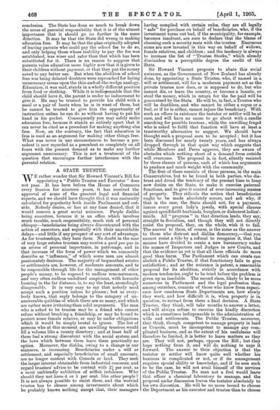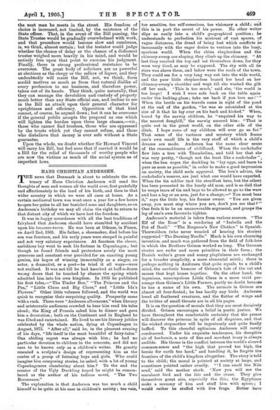Nv E rather wonder that Sir Howard Vincent's Bill for appointing
a "Public Trustee and Executor" does not pass. It has been before the House of Commons every Session for nineteen years, it has received the approval of Borne of the greatest legal and financial experts, and we should have thought that it was eminently calculated for popularity both inside Parliament and out- side. Nobody denies, or has at any time denied, that it would remove a great social nuisance. People dislike being executors, because it is an office which involves much trouble, much responsibility, much risk of personal obloquy—beneficiaries being always discontented with the action of executors, and especially with their unavoidable delays—and little if any prospect of any sort of advantage. As for trusteeships, they hate them. No doubt in the case of very large estates trustees may receive a quid pro quo in an access of personal importance, in patronage, and in that increase of the form of power which we commonly describe as "influence," of which some men are almost passionately desirous. The majority of bequeathed estates or.settlements are, however, of moderate amounts, and to be responsible through life for the management of other people's money, to be exposed to endless remonstrances, and very often endless undefined suspicions, with lawsuits looming in the far distance, is, to say the least, exceedingly disagreeable. It is very easy to say that nobody need accept such a position ' unless he pleases ; but as every- body knows, that reply belongs to the category of un- answerable quibbles of which there are so many, and which are rather more irritating than solid arguments. The man who is asked to be trustee may be a friend who cannot refuse without breaking a friendship, or may be bound to protect some female relative, or may be under obligations Which it would be simply brutal to ignore. The list of persons who at this moment are unwilling trustees would fill a volume like a county directory; and at least half of them feel a strong discontent with the social system and the laws which between them leave them practically no option. Moreover, the dislike, owing to a change in our manners, is increasing. Beneficiaries under a will or settlement, and especially beneficiaries of small amounts, are no longer content with Consols or land. They seek the larger interest obtainable from industrial concerns, and regard trustees' advice to be content with 2! per cent. as a most unfriendly exhibition of selfish indolence. Why should they not have 4 or 5 per cent. like other people ? It is not always possible to resist them, and the worried trustee has to choose among investments about which he probably blows nothing except that, their managers having complied with certain rules, they are all legally "safe" for purchase on behalf of beneficiaries, who, if the investment turns out bad, if the municipality, for example, becomes insolvent, are sure to declare that the blame of choosing such a security rests with the trustee. Enormous sums are now invested in this way on behalf of widows, female relatives, and. children ; and the tendency is always to increase the list of "Trustee Stocks," which already diminishes to a perceptible degree the credit of the State.
Sir Howard Vincent proposes to abate this social nuisance, as the Government of New Zealand has already done, by appointing a State Trustee, who, if named in a will or settlement, will for a moderate payment act as the private trustee now does, or is supposed to do, but who cannot die, or leave the country, or become a lunatic, or steal the money, which in retwn for the fee paid will be guaranteed by the State. He will be, in fact, a Trustee who will be deathless, and who cannot be either a rogue or a fool, or if he is either, cannot injure the beneficiary. With such an officer in existence the testator or settler will be at ease, and will have no cause to go about with a candle searching for possible trustees ; while the unwilling frigid who is asked to fulfil that function will have at least trustworthy alternative to suggest. We should • have thought such a proposal sure to be accepted ; but it has been discussed for nearly twenty years, and has always dropped through in that quiet way which suggests that while Members and Peers approve, they are aware of obstacles which nothing short of a demand from outside will overcome. The proposal is, in fact, silently resisted. by three classes of persons, each of which has arguments to produce and much weight with the community.
The first of these consists of those persons, in the main Conservatives, but to be found in both parties, who dis- trust and dread the tendency of the present time to heap new duties on the State, to make it exercise paternal functions, and to give it control of ever-increasing masses of property. They ridicule the notion that beneficiaries ought to be made absolutely secure, and ask why, if that is the case, the State should not, for a payment, insure every great lady's jewels, with special clauses against spendthrift husbands, burglars, or dishonest ladies'- maids. All " progress " in that direction leads, they say, straight to Socialism, and though they will not directly resist the proposal, they, on the whole, wish it to fail. The answer to them, of cotirse, is the same as the answer to those who distrust and dislike democracy,—that you cannot resist a tide by a refusal to recognise it, that the masses have decided to create a new bureaucracy under the names of Inspectors and Judges in new Courts, and that the evidence as yet is that all these officials do more good than harm. The Parliament which can create can abolish a Public Trustee, if that functionary fails to give satisfaction ; and as the nuisance is patent, a reasonable proposal for its abolition, strictly in accordance with modern tendencies, ought to be tried before the problem is given up as insoluble. The second class, likely to be more numerous in Parliament and the legal profession than among outsiders, consists of those who know from experi- ence how cumbrous State Departments are, how slowly they work, and how difficult it is, when property is in question, to extract from them a final decision. A State Trustee, they think, will take months to answer a letter, and will always refuse to exercise the kindly discretion which is sometimes indispensable in the administration of wills and settlements. The Public Trustee, moreover, they think, though competent to manage property in land or Consols, must be incompetent to manap,e any com- plicated business, and as the extent of his usefulness will therefore be limited, it is better to leave matters as they are. They will not, perhaps, oppose the Bill ; but they hope nothing from it, and will do nothing to urge it forward. The answer to their objection is that the testator or settlor will know quite well whether his business is complicated or not, or if its management requires special ability or knowledge, and if he sees such to be the case, he will not avail himself of the services of the Public Trustee. No man not a fool would leave that officer a chemical laboratory to manage, and the proposal under discusaion leaves the testator absolutely to his own discretion. He will be no more bound to choose the Department as his executor and trustee than to choose the next man be meets in the street. His freedom of choice is increased, not limited, by the existence of the State 'officer. That, in the event of the Bill passing, the State Trustee would be gradually overwhelmed with work, and that procedure would become slow and cumbrous, is, we think, almost certain ; but the testator could judge whether the chance of delay or the chance of a dishonest trustee weighed more heavily in his mind, and would be entirely free upon that point to exercise his judgment. Finally, there is strong professional resistance to be overcome. The great body of solicitors are as powerful at elections as the clergy or the sellers of liquor, and they undoubtedly will resist the Bill, not, we think, from sordid motives so much as from that natural dislike of every profession to see business, and therefore power, taken out of its hands. They think, quite naturally, that they can manage the devolution and custody of property much better than any State official can, and incline to see in the Bill an attack upon their general character for uprightness and efficiency. Opposition of that kind cannot, of course, be argued down ; but it can be overcome if the general public accepts the proposal as one which will lighten the burden upon three large classes,—viz., those who cannot find trustees, those who are oppressed by the trusts which yet they cannot refuse, and those who disbelieve that money is ever safe without a State guarantee.
Upon the whole, we doubt whether Sir Howard Vincent will carry his Bill, but feel sure that if carried it would be a Bill for the relief of thousands of worthy people who are now the victims as much of the social system as of imperfect laws.
HANS CHRISTIAN ANDERSEN.







































 Previous page
Previous page